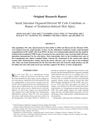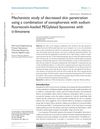 6 citations,
December 2019 in “BMC Complementary and Alternative Medicine”
6 citations,
December 2019 in “BMC Complementary and Alternative Medicine” Alcohol extract from Vernonia anthelmintica seeds may help treat stress-related hair loss.
61 citations,
April 2023 in “Bioactive Materials” Microneedles are effective for painless drug delivery and promoting wound healing and tissue regeneration.
 December 2022 in “Frontiers in Pharmacology”
December 2022 in “Frontiers in Pharmacology” Tianma Gouteng decoction may help prevent hair loss and promote hair growth.
9 citations,
September 2019 in “PLoS ONE” K42 and K124 keratins are only found in horse hoof lamellae.
 15 citations,
March 2013 in “Pharmaceutical nanotechnology”
15 citations,
March 2013 in “Pharmaceutical nanotechnology” Finasteride delivery through skin improved using invasomes and iontophoresis.
 19 citations,
July 1993 in “Journal of Applied Toxicology”
19 citations,
July 1993 in “Journal of Applied Toxicology” Different oil products cause varying levels of skin irritation in mice, which could potentially lead to tumors.
 17 citations,
May 2013 in “Oral and Maxillofacial Surgery Clinics of North America”
17 citations,
May 2013 in “Oral and Maxillofacial Surgery Clinics of North America” The document concludes that careful surgical methods and choosing the right materials are key for successful scalp, skull, and frontal sinus reconstruction.
 November 2024 in “The Journal of Cell Biology”
November 2024 in “The Journal of Cell Biology” Basement membrane changes are crucial for hair follicle development.
1 citations,
December 2023 in “Animals” Winter provides the best fur quality for Rex rabbits due to seasonal changes in specific signaling pathways.
 11 citations,
June 2005 in “Stem Cells and Development”
11 citations,
June 2005 in “Stem Cells and Development” Intestinal stem cells can help repair skin damage from radiation.
 February 2023 in “Molecules”
February 2023 in “Molecules” Cactus extract from Notocactus ottonis may help promote hair growth.
 3 citations,
February 2021 in “Evidence-based Complementary and Alternative Medicine”
3 citations,
February 2021 in “Evidence-based Complementary and Alternative Medicine” The Chinese herbal supplement BeauTop can potentially boost hair growth and thickness by increasing a protein called Vascular Endothelial Growth Factor.
 13 citations,
September 2019 in “Scientific Reports”
13 citations,
September 2019 in “Scientific Reports” High levels of the protein Flightless I worsen ulcerative colitis symptoms in mice.
 4 citations,
July 2020 in “BMC Complementary Medicine and Therapies”
4 citations,
July 2020 in “BMC Complementary Medicine and Therapies” Human placenta helps hair grow back after chemotherapy by blocking cell death and increasing hair follicle growth.
 11 citations,
December 2018 in “Bone”
11 citations,
December 2018 in “Bone” Removing a methyl group from the ITGAV gene speeds up bone formation in a specific type of bone disease model.
 3 citations,
July 2011 in “Folia Histochemica et Cytobiologica”
3 citations,
July 2011 in “Folia Histochemica et Cytobiologica” Calcium reduces involucrin in rat hair bulbs but doesn't affect filaggrin and Kdap.
 23 citations,
June 2014 in “Journal of Pharmaceutical Sciences”
23 citations,
June 2014 in “Journal of Pharmaceutical Sciences” Finasteride cream helps hair growth with less side effects.
 194 citations,
March 2003 in “American Journal of Pathology”
194 citations,
March 2003 in “American Journal of Pathology” Stress stops hair growth in mice by causing early hair growth phase end and harmful inflammation through a specific nerve-related pathway.
 2 citations,
May 2020 in “Journal of visualized experiments”
2 citations,
May 2020 in “Journal of visualized experiments” Controlled light treatment in mouse skin speeds up healing and hair growth.
 March 2017 in “Fundamental & Clinical Pharmacology”
March 2017 in “Fundamental & Clinical Pharmacology” The model and estimator can predict drug exposure in kidney transplant patients well.
 76 citations,
March 2005 in “Journal of Molecular Medicine”
76 citations,
March 2005 in “Journal of Molecular Medicine” Certain mice without specific receptors or mast cells don't lose hair from stress.
 6 citations,
February 2019 in “Scientific reports”
6 citations,
February 2019 in “Scientific reports” A brain-produced steroid causes increased scratching in mice with a skin condition similar to eczema.
 55 citations,
November 2018 in “American journal of human genetics”
55 citations,
November 2018 in “American journal of human genetics” Mutations in the LSS gene cause a rare type of hereditary hair loss.
 47 citations,
June 1996 in “International Journal of Legal Medicine”
47 citations,
June 1996 in “International Journal of Legal Medicine” Hair analysis for drugs needs a better understanding of how drugs enter hair, considering factors like hair structure and pigmentation.
 6 citations,
December 2015 in “International journal of nanomedicine”
6 citations,
December 2015 in “International journal of nanomedicine” Using sonophoresis can make it harder for certain drug-loaded liposomes to get through the skin.
 49 citations,
July 2004 in “Anesthesiology”
49 citations,
July 2004 in “Anesthesiology” The document concludes that more research is needed to understand how to treat muscle pain with drugs.
 3 citations,
May 2023 in “Clinical drug investigation”
3 citations,
May 2023 in “Clinical drug investigation” JAK inhibitors for alopecia areata are linked to minor side effects like headache and acne, but not to an increased risk of serious adverse events.
 3 citations,
November 2010 in “Rheumatic Diseases Clinics of North America”
3 citations,
November 2010 in “Rheumatic Diseases Clinics of North America” Pregnancy can cause symptoms similar to rheumatic diseases, making diagnosis difficult, and affects various body systems, requiring careful distinction between normal changes and serious conditions.
 7 citations,
January 2017 in “Clinical and medical investigations”
7 citations,
January 2017 in “Clinical and medical investigations” Suriname uses many plants for beauty, with potential for a beauty industry, but more evidence is needed for product effectiveness.
 January 2019 in “Przegląd Dermatologiczny”
January 2019 in “Przegląd Dermatologiczny” Chemotherapy with docetaxel can cause painful nail and skin side effects that may lead to stopping treatment.



























